South Africa in the global arena
South Africa in the global arena sadminFormer President Mandela once described apartheid South Africa as the “skunk of the world” that was diplomatically, economically and culturally isolated from the rest.
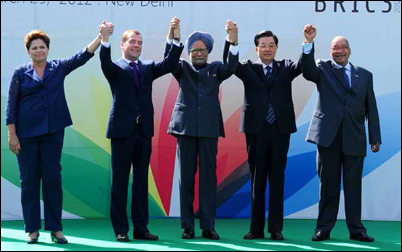 Angola, Botswana, Lesotho, Mozambique, Swaziland, Tanzania, Zambia and Zimbabwe, together with other African countries, had opposed apartheid and actively campaigned for the isolation of the apartheid state. Economic cooperation with the rest of the continent was severely limited.
Angola, Botswana, Lesotho, Mozambique, Swaziland, Tanzania, Zambia and Zimbabwe, together with other African countries, had opposed apartheid and actively campaigned for the isolation of the apartheid state. Economic cooperation with the rest of the continent was severely limited.
Developments since 1994
After the dawn of democracy in 1994, South Africa worked hard to reposition itself in the region, on the continent and in the world, with a shared interest in peace, stability and prosperity. To date the values enshrined in the Constitution, including equality, nonracialism, non-discrimination, liberty, peace and democracy, are central to South Africa’s national identity and find expression in the country’s foreign policy.
South Africa had to demonstrate to its own people and to the world that its democracy would be stable, that it would work to uplift the poor and redress past injustices at home, and that it would be a responsible member of the international community.
Inspired by the concept of Ubuntu, South Africa’s foreign policy approach was characterised by cooperation, collaboration and the building of partnerships rather than conflict and competition.
The country is now a respected member of the international community and has enjoyed successes in furthering its own interests, as well as those of the African continent and the Southern African Development Community (SADC) region.
South Africa’s reintegration into the global community has seen its diplomatic, political and economic relations increase rapidly to include countries with which it previously had no relations.
By 2012, the number of foreign diplomatic missions, consulates-general, consulates and international organisations in South Africa had increased to 315. This is the second-largest number of diplomatic offices accredited to any country after the USA. South Africa’s missions abroad increased from 36 in 1994 to 125 in 2012.
South Africa contributed to two tangible elements of the African renaissance during the first decade: the transformation of the continental political architecture with the transition from the Organisation of African Unity (OAU) to the African Union (AU) and the adoption of the New Partnership for Africa’s Development (Nepad) as the social development blueprint for Africa and the framework for its engagement with the north and other international actors.
In the second decade, operationalisation of the AU and implementation of Nepad became key focus areas, including, in particular, improving the climate for development and investment in Africa.
Acting together with its African partners, South Africa used its engagement with the Group of Eight (G8) countries to ensure the adoption of an Africa Action Plan as the framework for the G8’s partnership with the continent.
Strengthening the AU
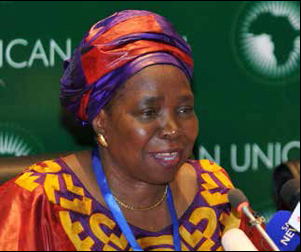 South Africa joined the OAU in 1994 and chaired the AU from June 2002 to June 2003. As the chair, South Africa played an important part in the formation of the AU’s institutions, policies and procedures, including the creation of the Pan-African Parliament and the AU Peace and Security Council.
South Africa joined the OAU in 1994 and chaired the AU from June 2002 to June 2003. As the chair, South Africa played an important part in the formation of the AU’s institutions, policies and procedures, including the creation of the Pan-African Parliament and the AU Peace and Security Council.
Pursuing the African Agenda required establishing and strengthening bilateral relations with almost all African countries.
In July 2012, former South African Home Affairs Minister Dr Nkosazana Dlamini Zuma was appointed as the AU Commission’s chairperson, to pursue for greater internal efficiency and effectiveness within the AU Commission as an executing agency of the AU collective.
The importance of Africa in South Africa’s foreign policy is reflected in the growth of South African representation in Africa, which increased from 17 in 1994 to the current total of 47 missions.
African Peer Review Mechanism
Founded in 2003, the African Peer Review Mechanism (APRM) aims to promote and reinforce high standards of governance through periodic reviews of progress towards achieving mutually agreed goals in the following focus areas: democracy and political governance, economic governance, corporate governance and socio-economic development.
In 2011, South Africa submitted its second report on the implementation of South Africa’s APRM Programme of Action (PoA). The report focused on the recommendations contained in the first Country Review Report of 2007, issued by the heads of state and governments of participating countries in the APRM and the resulting National PoA.
South Africa’s third report was submitted in January 2014 at the 22nd AU Heads of State or Government in Addis Ababa, Ethiopia. The country was praised for a number of best practices such as the use of provincial executive councils, the financial management system and the tax collection system.
SADC, regional integration
South Africa has sought to nurture regional integration at three levels: SADC, the Southern African Customs Union (SACU) and the Tripartite Free Trade Area (TFTA) between the Common Market for Eastern and Southern Africa, the East African Community and SADC. The TFTA seeks to combine the three major regional economic communities as building blocks towards continental integration and could contribute to economies of scale, the building of new distribution channels, value addition and manufacturing in Africa.
South-south cooperation
South Africa regards the valued partnership with countries of the global south as being important for the development of the country and the continent, and for creating solidarity in the global struggle against poverty, underdevelopment and the marginalisation of emerging economies.
To strengthen ties with other developing countries, South Africa has joined the following structures:
• Non-Aligned Movement (NAM).
• Group of 77 and China.
• Indian Ocean Rim Association for Regional Cooperation.
• New Asian-African Strategic Partnership.
• India-Brazil-South Africa Partnership Forum (IBSA).
• Brazil, Russia, India, China and South Africa (BRICS) Intergovernmental Forum.
BRICS
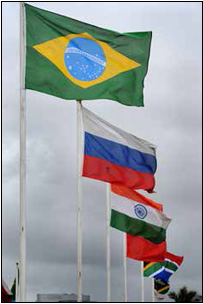 South Africa identified with the BRIC agenda of global reform and cooperation within the developing world, and joined the forum in 2011. Its invitation to join the BRIC grouping was recognition of the country’s contribution in shaping the socio-economic regeneration of Africa, as well as its active involvement in peace and reconstruction efforts on the continent and the responsible role that South Africa has been playing in the international community.
South Africa identified with the BRIC agenda of global reform and cooperation within the developing world, and joined the forum in 2011. Its invitation to join the BRIC grouping was recognition of the country’s contribution in shaping the socio-economic regeneration of Africa, as well as its active involvement in peace and reconstruction efforts on the continent and the responsible role that South Africa has been playing in the international community.
South Africa’s standing in BRICS and other groupings indicates that the country is regarded as a significant emerging power, worthy of attention in global decision-making. In 2011, South Africa ensured that infrastructure development and industrialisation in Africa was on the agenda at the BRICS summit in Sanya, China.
In March 2013, the country hosted the fifth BRICS Summit and for the first time invited African regional leaders to an inclusive BRICSAfrican Leaders dialogue on infrastructure development. The summit established a BRICS-led development bank for infrastructure and sustainable development projects in BRICS and other developing countries. Agreements have been signed under the auspices of the BRICS Interbank Cooperation Mechanism to provide, proposals for extending credit to member countries in their local currencies.
Other countries of the South
Since democracy, South Africa’s relations with countries in the Americas – specifically Argentina, Brazil, Colombia, Mexico and Venezuela – have strengthened. Relations with Turkey and key Gulf states have also improved.
Relations in southeast and east Asia have focused on China, Indonesia, Singapore, South Korea, Thailand and Vietnam, while south-Asian relations have primarily focused on Bangladesh and Pakistan. Relations with countries in Euro-Asia have developed a strong trade element.
As the National Development Plan (NDP) states, South Africa has considerable mineral resources, highly developed banking, financial, communications and transportation networks, and established and relatively successful business, industrial, mining and research institutions.
These resources could be critical for negotiating within BRICS and the world. For example, it could play an important role in facilitating trade and investment between Africa and Asia, maximising Asia’s interest in the country and the continent’s mineral resources, while promoting its own highly developed financial system.
North-South cooperation
Since 1994, South Africa has aimed to improve North-South relations, focusing on reforming the global economy and global governance, enhancing market access for developing countries and instituting more favourable terms for trade, debt relief and new forms of partnership for development.
During its first decade of freedom, the country was largely successful in engaging the G8 and the Organisation of Economic Cooperation and Development (OECD) to strengthen its economic relations with key countries and the European Union (EU). As a result, trade with the north has grown consistently and remains strong, despite the effects of the global economic crisis.
OECD
In 2007, the Organisation of Economic Cooperation and Development Ministerial Council gave South Africa and other BRICS states “enhanced engagement” status in recognition of their global significance. Until this point, South Africa had been an observer.
European Union
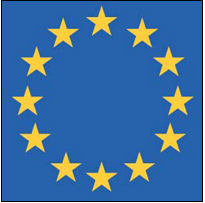 Bilateral relations with South Africa’s traditional partners in Western Europe have remained strong and expanded since 1994, notably with the United Kingdom, Germany, the Netherlands, France, Italy and the Nordic countries.
Bilateral relations with South Africa’s traditional partners in Western Europe have remained strong and expanded since 1994, notably with the United Kingdom, Germany, the Netherlands, France, Italy and the Nordic countries.
The Trade and Development Cooperation Agreement (TDCA), which entered into force in May 2004, is the overall agreement that regulates the relationship between South Africa and the 28 member EU. The TDCA provides for a Free Trade Area and dialogues at Senior Official, Ministerial and Presidential/Summit level. In addition to the TDCA, South Africa has signed a Science and Technology Agreement (STA) and a Wines and Spirits Agreement with the EU.
South Africa is the only country in Africa that enjoys such a strategic partnership with the EU. By 2009, South Africa was the EU’s 14th largest trade partner and the second-largest from Africa. Various trade agreements are also in place between South Africa, the EU and regional economic groupings. South Africa was a member of an AU group that engaged the EU on an EU-Africa strategy, which was adopted in 2007.
Despite the international economic crisis that impacted negatively on Western Europe, countries in the region remained South Africa’s leading partners in areas such as trade, investment and tourism.
Many of these countries are committed to supporting government priorities such as boosting employment, skills-enhancement and vocational education programmes. Europe remains a leading continent in terms of scientific, technological and pharmaceutical research and capacity, in which the country has found valuable bilateral partnerships.
African multilateral partnerships
The various African multilateral partnerships in which South Africa has played an important role since 1994 aim to strengthen the continent’s human capacity and productive bases by diversifying economies and attracting investment.
These partnerships have refocused the world’s attention on Africa’s potential and its challenges. They have enabled the mobilisation of resources to address Africa’s development objectives. The various partnerships also afford Africa the opportunity to solicit the necessary training, capacity-building, infrastructure and financial resources to implement key AU-endorsed priority continental projects and programmes, including aiming to achieve the vision, objectives and goals of Nepad.
Institutions of global governance
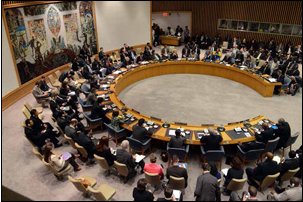 South Africa’s foreign policy has traditionally placed the UN at the centre of the multilateral system. In collaboration with its global partners, the country has consistently continued to engage the north on reforming global economic rules through the World Bank, the International Monetary Fund, the World Trade Organisation and the United Nations Conference on Trade and Development.
South Africa’s foreign policy has traditionally placed the UN at the centre of the multilateral system. In collaboration with its global partners, the country has consistently continued to engage the north on reforming global economic rules through the World Bank, the International Monetary Fund, the World Trade Organisation and the United Nations Conference on Trade and Development.
The country’s constructive role in global governance structures, as well as its position within organisations such as the AU, the NAM and the G77 and China contributed to a positive perception of South Africa’s global profile by BRICS and other like-minded partners.
The international community entrusted South Africa with hosting and presiding over COP17/CMP7 in Durban, at a critical time in the global climate-change debate. This conference resulted in the Durban Outcome, which has been hailed internationally for restoring trust in the UN climate-change process. South Africa has also hosted other international conferences and meetings under the auspices of the UN.
In 2002, the country hosted the World Summit on Sustainable Development where it advocated for an action-orientated outcome with a set of targets for sustainable development. These efforts resulted in the adoption of the Johannesburg Plan of Implementation, which gave content to the Agenda 21, the UN plan on sustainable development.
Peace, security and stability The AU has expressed its commitment to not recognise unconstitutional changes in government and to develop its own African Standby Force (ASF) to intervene in conflict situations. South Africa played a critical role in the establishment of the African Capacity for Immediate Response to Crises at the AU Summit of May 2013, as an interim measure towards the establishment of a permanent ASF.
Contributing to peace, stability and postconflict transition in Africa has been integral to South Africa’s post-apartheid policy. Since 1994, the country has earned a reputation for being an accomplished mediator, with successive presidents playing key roles in negotiating settlements elsewhere in Africa, such as in Madagascar, Sudan and Zimbabwe.
Through its role in SADC, South Africa mediated in Madagascar after a 2009 coup, helping to secure an agreement to lead Madagascar out of crisis. This culminated in Madagascar holding a referendum in 2010 and elections in October 2013. Closer to home, South Africa was the SADC-mandated facilitator in Zimbabwe. Its efforts contributed to Zimbabwe adopting a new constitution in March 2013, laying the basis for credible elections, which were held in July 2013.
In 2013, South Africa contributed troops, together with the Republic of Malawi and the United Republic of Tanzania, to the SADC-led Intervention Brigade in the Eastern Democratic Republic of Congo (DRC) under the UN mandated peace mission to end the military attacks and violation of human rights perpetrated by the M23 rebels against the civilian population. This intervention resulted in the M23 renouncing the rebellion and agreeing to enter into negotiations with the DRC government.
South Africa also contributed to conflict resolution on the continent through its role as a member of the AU ad hoc high-level committee on the resolution of the Libyan crisis and as a member of the AU high-level panel for the resolution of the crisis in Côte d’Ivoire.
Over the years, the country has contributed a substantial number of troops to African peace missions, supporting peace processes in the Central African Republic (CAR), the DRC, Mali and Sudan. While its support for peace missions has largely been a success, the killing of 13 South African soldiers in the CAR in 2013 underlines the risks involved.
In the global arena, the country has served two terms (2007–2008 and 2011–2012) as a nonpermanent member of the UN Security Council. The country used the opportunity to elevate Africa’s interests, especially regarding peace, security and development, and to advance closer cooperation between the UN and regional organisations such as the AU.
Source: Twenty Year Review